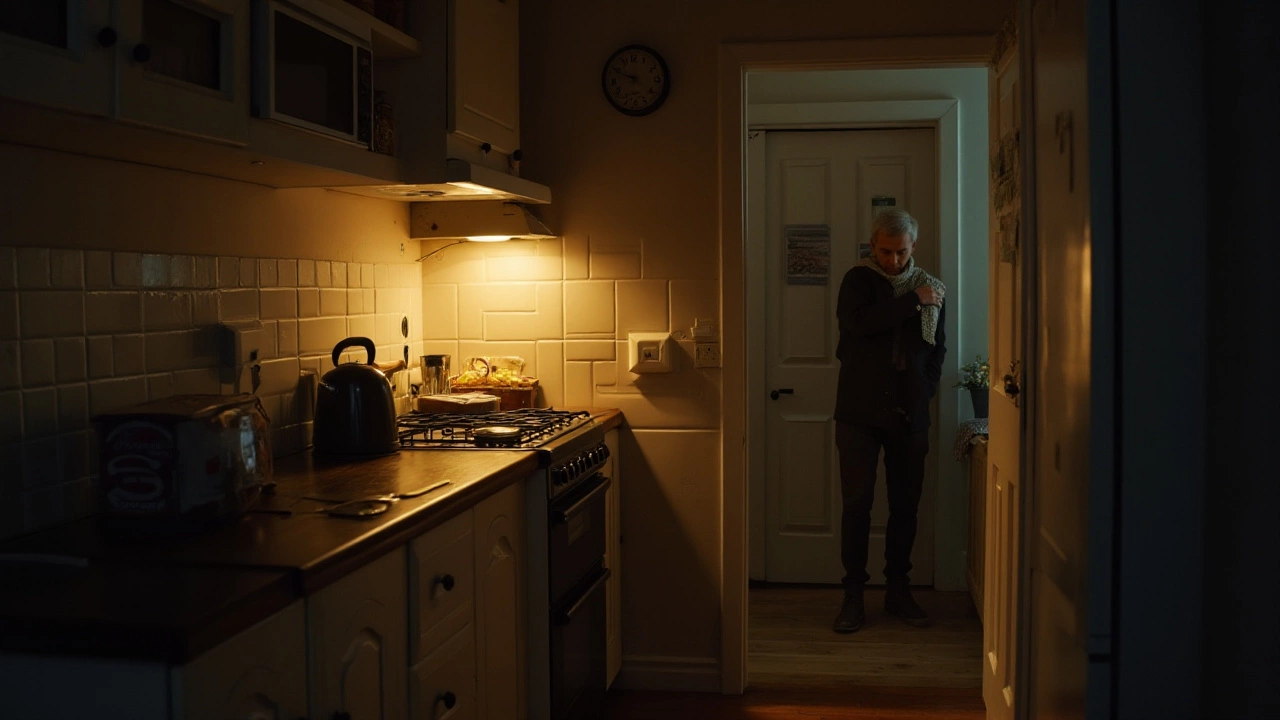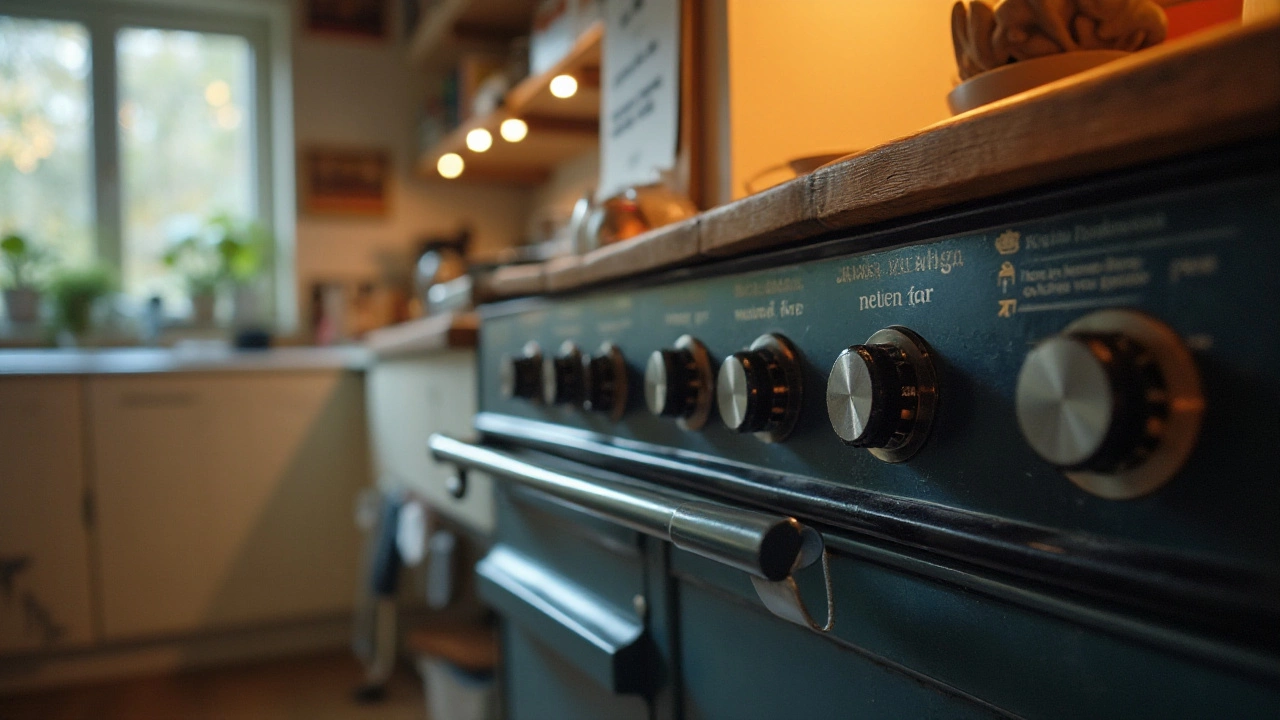
- 31 Dec 2024
- Gideon Thornton
- 0
In a world where convenience often takes the lead, we sometimes overlook the potential perils that come with our everyday appliances. Your electric oven, a staple of modern kitchens, offers both the benefit of sumptuous home-cooked meals and the risk of safety hazards if not properly managed.
The notion of leaving an electric oven on overnight might seem like a harmless way to keep food warm or slow-cook a dish, but it's a practice that requires a closer look. Beyond the obvious safety concerns, there are energy implications and wear-and-tear issues to consider.
Join us as we delve into why leaving your electric oven on all night might not be the best idea. We’ll uncover potential risks, explore practical safety tips, and touch on some common issues that might require professional attention.
- Understanding the Risks
- Energy Consumption and Costs
- Safety Precautions to Consider
- Common Oven Malfunctions
- Tips for Safe Oven Use
- When to Seek Professional Repair
Understanding the Risks
When it comes to leaving your electric oven on throughout the night, several underlying risks could potentially turn your culinary convenience into a hazardous misadventure. To paint a clear picture, let's consider the first and most pressing issue: fire hazards. Electric ovens, while generally secure, can malfunction due to a variety of internal components failing over time. These failures can lead to shorts or smoulder in the insulation, creating a recipe for disaster. According to the National Fire Protection Association, cooking equipment remains the leading cause of residential fires, accounting for 49% of incidents accompanied by a notable fraction involving oven mishaps. With such significant statistics, it's hard to dismiss the danger an unwatched electric oven poses overnight.
"Cooking fires are not uncommon, yet easily preventable. Modern households must remain vigilant about leaving cooking equipment unattended," notes the NFPA report on household safety.
Another risk seldom considered is the hazard associated with carbon monoxide poisoning. Many electric ovens feature self-cleaning settings that, when left operating for prolonged durations, may release this silent yet deadly gas. While gas ovens are notorious for carbon monoxide risks, certain electric variants equipped with smudging elements and inadequate vent systems may find themselves in similar predicaments. This warrants a ponderous reflection on the air quality within your home, especially when the oven's on overnight and the windows shut tight to keep out that winter chill.
Beyond immediate safety threats, there's also the matter of electrical overload and appliance strain. Maintaining an active current through the night translates into excess energy consumption, which compounds into hefty electricity bills. Yet, the financial implications are not the end-all concern; this continuous power usage taxes the oven's components, resulting in accelerated wear and potential breakdown. Such stress can hasten failures, causing premature trips to the oven repair shop, leading to more dollars drained from your pocket.
With these risks in mind, the necessity of a proactive approach to kitchen safety becomes evident. Ensuring an oven is never unnecessarily left on isn't just about safeguarding costs; it's about securing peace of mind, knowing your home is under protection from the unpredictabilities that unchecked heat could welcome. So, consider these factors closely the next time a slow roast tempts you into indulging in overnight cooking. The potential hazards at play demand both respect and resolute adherence to safe cooking practices.
Energy Consumption and Costs
Electric ovens, while champions of culinary convenience, are also notable power consumers when left running, especially overnight. When you leave an electric oven on, it operates continuously to maintain the desired temperature, leading to a significant use of electricity. The energy draw depends on the oven's specifications and the temperature setting. Typically, an electric oven consumes between 2,000 to 5,000 watts, correlating with its size and age. This consumption multiplies when the appliance is used for extended periods.
The cost implications of leaving an oven on overnight shouldn't be underestimated. To put it in perspective, if your electric oven uses an average of 3,000 watts and your electricity rate is 12 cents per kWh, running it for eight hours could cost almost $3 per night. While this may not seem like a fortune, repeated usage like this compounds quickly over time and on your utility bill.
Moreover, continually using an oven at high wattage levels can also impact its longevity. Frequent all-night operations might increase wear and susceptibility to needing oven repair. As stated in an energy report, “Reducing unnecessary appliance use is a simple and effective way to lower home energy use and extend appliance life.” The importance of awareness around energy consumption is underscored by financially-savvy homemakers keen on balancing home efficiency and expense.
Addressing these issues involves making informed decisions about appliance operation. Conserving energy benefits both your wallet and the environment, reducing your carbon footprint while minimizing household expenses. By integrating conscious energy use practices, such as leveraging your oven's timer or planning cooking schedules around your waking hours, you can achieve more sustainable appliance use. In the long run, being mindful about your oven usage aligns with both financial sensibility and environmental stewardship.

Safety Precautions to Consider
Every year, stories arise about kitchen mishaps that could have been avoided with a bit of foresight. Leaving an electric oven on overnight is one such risk that begs for attention. The very first rule in the realm of kitchen safety is to never leave cooking appliances unattended. Despite being equipped with advanced technology, electric ovens are not immune to malfunctions. Make it a habit to double-check that all dials and switches are turned off before leaving the kitchen for an extended period. This simple gesture might just prevent a potential disaster lurking in the shadows.
Another key precaution involves focusing on proper maintenance. Ovens are complex machines, and lack of upkeep can lead to undetected issues. Regularly inspect your oven's components, paying close attention to any frayed cords or discolored wires, which could indicate overheating or electrical problems. It's recommended to schedule professional check-ups annually to ensure everything is functioning as it should. If you're unsure about what to look for during a maintenance check, a professional electrician or appliance repair specialist can provide a trusted guideline.
Electric oven safety also extends to understanding the materials you're working with. Avoid using aluminum foil on the bottom of the oven, as it can obstruct airflow and cause a fire hazard. Moreover, make certain that your oven’s interior is free from grease and food residue, which are infamous for starting dangerous flare-ups. By keeping a clean cooking environment, you reduce the risk of fire and enhance the longevity of your appliance.
“In terms of fire safety, unattended cooking is the leading cause of home fires,” says the National Fire Protection Association (NFPA).To maximize safety, consider adding a smoke detector or a heat-resistant fire extinguisher near your kitchen. These devices offer peace of mind and a layer of protection should things take an unexpected turn. Remember to test these gadgets periodically to ensure they are operational. Leaving an oven on overnight stands as a reminder of the risks associated with complacency in the kitchen, but with the right tools and practices, safety can be significantly ensured.
Furthermore, educating yourself and your family on these risks and precautions is invaluable. Conduct regular drills and discussions on how to handle various emergency scenarios in the kitchen. Understanding the proper way to respond to an oven fire, for instance, can make all the difference in an emergency. Encourage everyone in your household to be mindful of electric oven safety at all times.
Lastly, technology today offers tools that can aid in safety. Consider smart appliances or plug-ins that can automatically shut down after a certain period or alert you via smartphone notifications if left on for too long. These innovations add a layer of precaution for those who are prone to forgetfulness, adapting safety to the modern pace of life.
Common Oven Malfunctions
When it comes to electric ovens, common malfunctions can disrupt your culinary routine, leading to both frustration and potentially bigger issues over time. One notable problem that many homeowners face is irregular temperature control. This can occur due to a faulty thermostat, which is crucial for maintaining the correct temperature throughout the cooking process. When the thermostat doesn't function properly, it may result in undercooked meals or worse, incinerated food. Such inconsistencies can lead to uneven cooking results, making it challenging to achieve that perfect bake or roast.
Another frequent issue is the oven's failure to heat up entirely. This can stem from problems with the heating elements, typically the bake or broil elements within the appliance. These elements are responsible for producing the heat required for cooking your meals. If they are damaged or burnt out, the oven may not get hot at all, leaving you with uncooked dishes. It's crucial to inspect these elements if you notice a drop in performance, as replacing them can often resolve the issue.
Moreover, an often overlooked but important malfunction involves the oven door not closing properly. A loose or broken hinge might be the culprit here, which can lead to heat escaping. This not only increases your energy bills significantly due to consistent energy loss but also makes cooking times much longer than necessary. Ensuring that the door seals tightly when closed is a simple yet effective way to maintain energy efficiency and ensure that your meals are cooked evenly. Oven repair tips should always include checking the door's condition as part of routine maintenance.
Let's not forget about the electronic control panel, which can be a source of headaches. Be it a complete electronic failure or just some of the buttons not responding, this malfunction can render the oven unusable. Repairing these intricate systems often requires professional expertise, since it involves dealing with complex electronic components. Considering potential costs, maintaining the integrity of the control panel through regular cleaning and avoiding moisture exposure can prolong its functional life.
To provide a more comprehensive approach to tackling these issues, here’s a brief set of steps you might take:
- Check your oven's temperature with a reliable oven thermometer to ensure accuracy.
- Inspect heating elements regularly for visible signs of damage.
- Verify the door seals and hinges for integrity and tight closure.
- Clean the control panel using a soft, damp cloth to prevent buildup and avoid any liquid from seeping into the mechanisms.
According to the Appliance Standards Awareness Project, energy-efficient ovens can save homeowners a substantial amount in bills annually. Maintaining your electric oven not only prolongs its life but also secures more financially sustainable cooking habits. As experts often say:
"A well-maintained oven can save both time and energy, making every meal more enjoyable."Troubleshooting these electric oven issues might seem daunting at first, but being aware of common malfunctions is the first step toward keeping your kitchen running smoothly. Recognizing these signs early allows you to take action promptly, either by attempting a DIY fix where feasible or reaching out to a professional when necessary. This proactive approach ensures both safety and efficiency, keeping your oven in prime condition.

Tips for Safe Oven Use
When it comes to ensuring safety in the kitchen, particularly with your electric oven, attentiveness and knowledge are key. This essential appliance, while incredibly useful, can pose risks if not operated with care. Begin by setting a habit of always checking your oven before leaving the house or going to bed. This simple practice can save you from potential mishaps and offers peace of mind.
It's also crucial to make regular cleaning a part of your routine. A buildup of grease and leftover food particles is a common cause of oven fires. By keeping the interior of your oven spotless, you significantly reduce the risk of unexpected flare-ups. Periodically make use of the oven's self-cleaning feature if available, but remember to do so when you're home to monitor the process.
Regular Maintenance and Inspections
Investing time in regular maintenance and inspections can prevent a vast majority of common oven issues. Ensure your oven's door seal is intact; a faulty seal means heat is escaping, which leads to longer cooking times and higher energy consumption. It's a good idea to inspect the gasket for any tears or wear and replace it if necessary. Likewise, checking the condition of the heating elements can avert many common oven repair problems.
Consider scheduling an annual inspection with a professional, especially if your oven is older. A licensed technician can spot potential problems early, safeguarding your home and maintaining your oven's efficiency. As oven technology evolves, it might be wise to stay informed about any recalls or updates from your oven's manufacturer.
Using the Oven Responsibly
An electric oven is more than just a kitchen appliance; it's a tool that requires responsibility. Never use it to heat your home, as this poses severe risks, including carbon monoxide poisoning and fire hazards. Instead, gear your focus on using electric oven safety practices. To illustrate the importance of these precautions, consider a piece of wisdom from the National Fire Protection Association:
"The leading cause of fires in the kitchen is unattended cooking."Be sure your kitchen is equipped with a working fire extinguisher and functioning smoke detectors, and everyone in the household should know how to use them.Finally, be mindful of your cooking habits. Avoid wearing loose clothing when using the oven, as fabric can easily catch fire. Use oven mitts when handling hot pans and racks, and keep flammable items like kitchen towels and oven mitts away from the stovetop. Following these practices can help prevent injuries and ensure that your time in the kitchen remains safe and enjoyable.
When to Seek Professional Repair
At times, your dependable electric oven might exhibit signs that dining at home could turn into a potential hazard. Knowing when to call in a professional can save both time and money, and more importantly, keep your household safe. A few key indicators tell you it might be time to enlist the aid of a professional repair technician. If your oven refuses to turn on or off properly, this could be more than just an inconvenience; it often points to electrical issues or faulty wiring, which can be hazardous. These situations require the expertise of someone familiar with electric oven safety to prevent further complications or risks.
Another telltale sign that professional assistance is needed is when your oven is not heating evenly. Uneven heating could lead to undercooked meals or burned recipes, and it typically signifies that a heating element is malfunctioning. Professional repair ensures any components that are deteriorating are replaced with quality parts, restoring your oven’s efficiency. While modern ovens often come equipped with digital displays, any error codes popping up frequently indicate internal issues that should be addressed by a professional. Attempting a DIY repair in these complex systems might void any warranties you have, or worse, exacerbate the underlying problems.
Moreover, strange noises or unusual odors emanating from your oven should not be ignored. These could be symptomatic of deeper mechanical issues. Professional technicians possess the experience to diagnose whether these are benign quirks or symptoms of more significant failures waiting to escalate. According to the U.S. Consumer Product Safety Commission, thousands of fires start each year due to electrical oven failure.
"Preventive maintenance and timely repair can mitigate these risks significantly," notes John McCarthy, a seasoned appliance repair expert.As tempting as it might be to troubleshoot issues on your own, recognizing the limitations of your expertise is crucial. When basic solutions like resetting the oven or checking the power supply do not suffice, contacting a professional ensures the warranty and safety standards are maintained. They can offer lasting solutions and provide valuable advice on maintaining the appliance's longevity. Paying attention to these signs and opting for professional help promptly can prevent more significant expenses in the future and guarantee peace of mind.
Sometimes, vague performance issues like sudden increases in energy bills suggest the oven is working harder than necessary due to internal inefficiencies. This situation can often be rectified through expert calibration, which aligns the oven to optimal energy usage, ensuring your electric oven is not a drain on resources. A well-tuned oven not only cooks efficiently but also extends its lifespan. Modern ovens are sophisticated, with components that occasionally need professional calibration to realign them to manufacturer specifications, preserving both the appliance and the environment.
Looking out for these warning signs can guide when professional intervention becomes necessary, providing reliable and effective solutions. Keeping an open line with a local electrician or repair technician can be beneficial, ensuring your kitchen remains a safety haven and the heart of home-cooked happiness.

